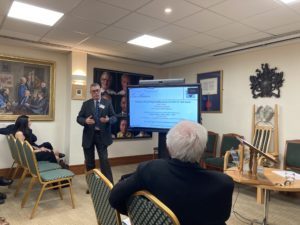DEATH TAXES: AN HISTORICAL COMPARISON – PROF MARTIN DAUNTON
On 17 October 2023, the Worshipful Company of Tax Advisers was delighted to welcome Prof Martin Daunton to give the first in person talk since before the pandemic. Martin is well known to the History of Tax group – this was his fourth visit, and he gave us another fascinating talk, this time on death taxes.
Martin considered the death taxes of the UK, US, Germany, and France, focusing mainly on the period since 1900. The various taxes on death in each country were looked at to address three questions, namely:
· Should tax be paid on the total value of the estate, or by each recipient, and at what rate;
· Should inheritance tax be used to rebalance active and passive wealth; and
· Should tax be used to break up large fortunes.
At different times and in different territories, tax has been levied on either the total value of an estate or on a recipient, sometimes with rates varying depending on the closeness of the relationship with the deceased, and limits on testamentary discretion. For example, in Germany in 1906 tax was paid on the amount inherited, at varying rates depending on the closeness of the relationship, with no tax on inheritances by the spouse or children of the deceased. However, there were prescribed limits on bequests, with a requirement that 50% of an estate was to be left to legitimate heirs. By comparison, the US taxed the total value of an estate, with complete testamentary freedom.
As well as being revenue raising, death taxes had a role to play in rebalancing or redistributing wealth. Rebalancing wealth was a theme in the policy underpinning UK death taxes, based on the theory that inherited wealth does not stem from achievement and so passive wealth could be harmful to both enterprise and the morals of the recipient. In Winston Churchill’s 1925 budget he referred to the need for “energetic creation of wealth” as being vital in the post war period, with inheritance tax being a “penalty on inertia”. By contrast the US saw death taxes as a method of redistributing wealth and preventing fortunes from being passed down the generations, effectively creating a new aristocracy and, in Franklin D Roosevelt’s words, perpetuating “great and undesirable concentrations of control”.
This brief summary cannot do justice to the depth and scope of Martin’s talk, and we must wait for his next book to read more on this subject. As always, his presentation was stimulating and very timely with a general election in the next year or so and the debate about the future of Inheritance tax. Much can be learned from the past experience!
The next History of Tax event is on 27 February 2024 when Pat O’Brien will give a centenary perspective on Irish taxation in a talk called “Out of the ruins”.


